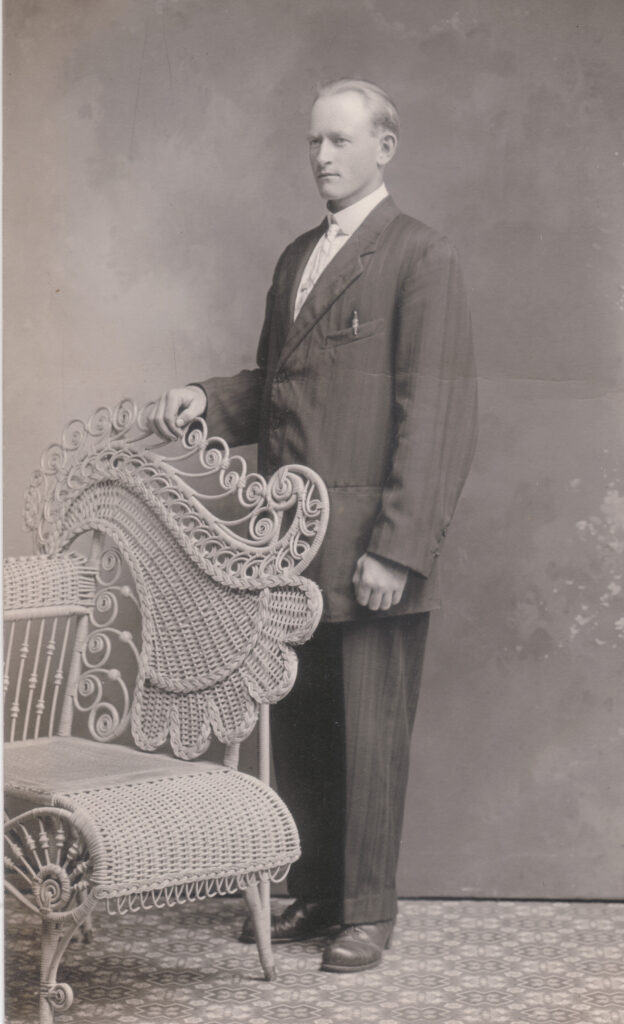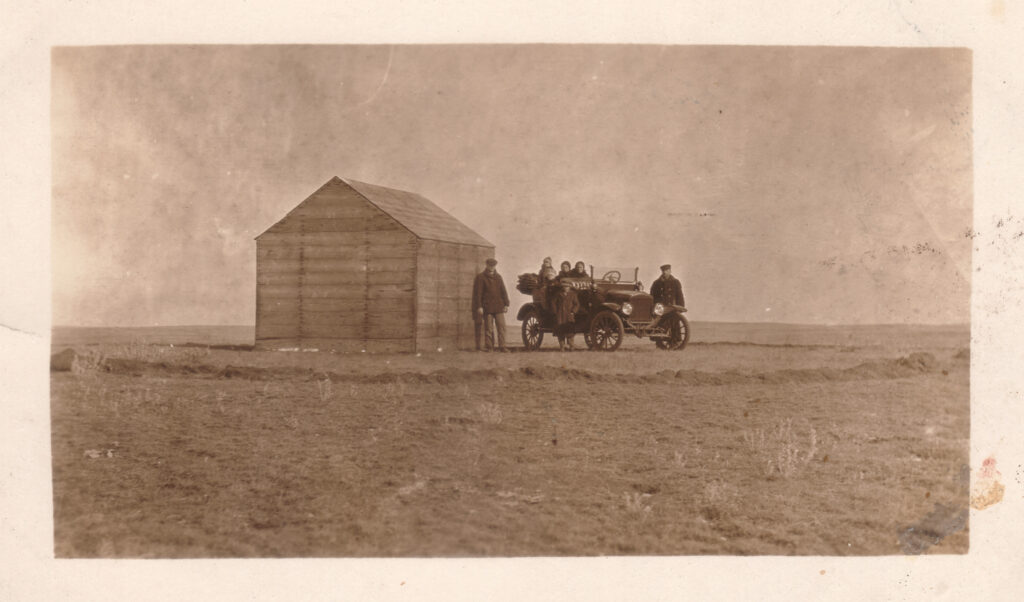To this point, I have focused primarily on direct ancestors of our family: parents, grandparents, great-grandparents, etc. It is my plan to continue that emphasis, for the most part. However, there are some documents and accounts of relatives who are not direct ancestors which I believe will be of much interest to our clan.
For example, in the biography of Oma compiled by Kim Plymel (Tell Me Your Story, Grandma), Oma recalls when she and Opa went to live in Montana about a year after they were married. While there, Opa served as a sort of interim pastor for a church in Fort Peck for a few months. Oma adds, “At the same time we were helping my Aunt Katherine and Uncle Diedrich Olfert at his very large ranch in Glasgow for harvest and such. They were like a mom and dad to us.”
The Aunt Katherine to whom Oma refers was the sister of Oma’s mother, Agatha Franz Toews. In other words, Dietrich and Kathrina Olfert (which is how they formally spelled their names) are not direct ancestors of ours, but they are our relatives. Furthermore, they have an interesting story to tell about their lives and their homesteading experience. They wrote an extended account which I believe you will find valuable from both a family and a historical perspective. Because of its length, my plan is to present their story over a series of blogs. Except for punctuation corrections and slight spelling adjustments, I have tried to present the narrative as it was given by Dietrich and Kathrina.
Enjoy!
Our Homesteading Story, Lustre, Montana 1916
Dietrich M. Olfert (1894-1987) and Kathrina Franz Olfert (1893-1982)
I, Dietrich, was born on April 11, 1894, in Cottonwood County, southwest of Mountain Lake, Minnesota. My ancestors came from Wales to Holland and then South Russia. Since my father’s and grandfather’s names were also Dietrich, I started using the initials D. M. to lessen the confusion. The initial M stood for Mary, my mother’s name. The very first thing I still remember took place in the fall of 1896 in Minnesota. My brother David, who is 3 years older than I, was standing with me on the platform of the well. There was a pump, and the handle was made of wood. David and I pulled on the pump handle and broke it. Daddy took David and gave him a good spanking. I was so scared and ran in the breezeway, crawled behind the door and finally must have fallen asleep, because the next thing I knew I woke up in my little crib in the house.
Once when Mother and Daddy were stacking bundles in the field and David (5½) and I (2½) were alone at home, we ran away south through the pasture and over the little creek and through the fence. Dave lifted the wire for me to crawl through, and on to the neighbors we went. We were going to explore the world. When the neighbor lady (Mrs. Dave Schultz) came out and saw us, she scolded us and sent us back home, which was about one mile. When we came back to the creek, Daddy and Mother came driving with the buggy, looking for us. It was very hot and I was very thirsty, so they gave us a drink of water, then took us home in the buggy. They were very glad to find us.
There were nine children in my family: four brothers, then four sisters and then another brother. Dietrich and Abe were in charge of the horses, and John and Dave were in charge of the cattle. They had about 28 horses, as each boy had a team of four plus the others for other jobs. One pair was just for pulling the buggy. There were 30 to 40 head of cattle and six or eight milk cows. I remember the names of three of my team were: Lay, Lori and Topsy. We broke the two year olds and used the colts they raised. We didn’t sell any of them, but used them on the farm.
Once we were going to take a new team to church . It was the first time they were to go that far and among people. The horses spooked and ran away, with me hanging on for all I could. Through the ditch and through the fence we went. I stayed with them until I could stop them about a half mile away. When I got them turned around and started back, Dave stood on the fence wire and I drove the horse and buggy back across. Everyone got into the buggy and went on to church with no more trouble.

When I was about five years of age my folks moved from this farm to a place two miles west of Butterfield, Minnesota. Here is where I started to school. The first year Peter Friesen (later a missionary to India) was my teacher and the next year Abe Becker. The school was about five miles from home, so the students stayed in the school, for it was too far to travel by horse in the winter snow. The school was in the Valley church and was all in high German. I didn’t start to learn English until several years later when I went to the country school only 1/8 mile away from home. One teacher taught all eight grades, and I went through 7th grade. My best subject was arithmetic, and spelling was my worst. They had what they called spell downs. If a student misspelled a word they had to sit down. I was usually the first one to sit down. After that I stayed home and helped Dad on the farm. School was not compulsory then.
The following year I tried school again but, lo and behold, I had forgotten so much I had to retake the 7th and then try 8th, but I never finished. About this time I took 10 piano lessons, but then quit. No time to practice. Some of the games we played in school were: shinny stick (like golf or English cricket), baseball, ante over, tag, pump-pump pull away, finny on your own side, fox and the geese, hunting (fox and rabbit) and ice skating.

When I was about 14 years of age a Mr. Rempel came over driving a Hupmobile car and visited Dad. I stood and listened, as the car was a great attraction. He asked Dad to buy the car, but Dad said “No.” I also said that he should get it. Dad said they couldn’t, because no one knew how to drive it. I said that I could drive it. “Okay,” Mr. Rempel said, “let’s see if you can. If you can drive it then your dad should buy it.” Dad got into the back and Mr. Rempel in the front, and I got behind the steering wheel and he told me what to do. Off we went on the road to the west. I drove 40 to 50 miles per hour and scared everyone. Mr. Rempel said to slow down, as I didn’t have the experience yet to drive so fast. We went back to the farm and, sure enough, Dad bought the car ($750). My sisters, ages 2, 4, 6 and 8, got in the back seat, and I drove them to town to take Mr. Rempel back to Butterfield. It was the first time they had ever seen a car. After we had dropped off Mr. Rempel, I treated the girls to an ice cream cone for 5 cents each. They didn’t know what it was. I said that they should eat it. They said, “No, it’s too cold.” So they took them home and dropped them in the oldest sister’s apron on her lap. It was all melted and made a terrible mess. (Little did anyone realize D. M.’s fascination with mechanical things. Over the years that followed, he would drive many miles on wheels—motorcycle, cars, trucks, tractors, and even an airplane.)